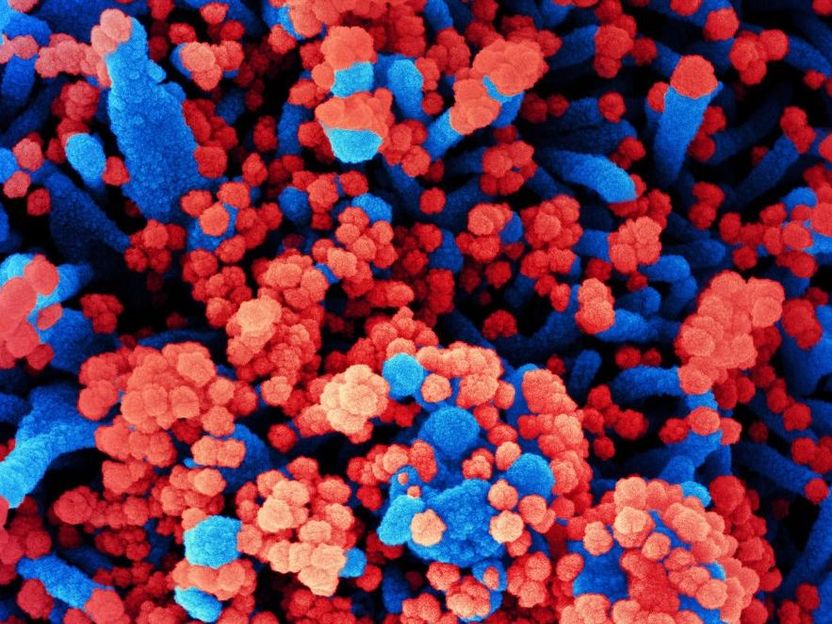A CSIC team produces neutralizing antibodies effective against covid-19
These antibodies, based on the dromedary immune system, have therapeutic potential in immunodeficient patients or those not protected by vaccines
Advertisement
CSIC researchers have obtained neutralizing antibodies that are effective against the most virulent variants of SARS-CoV-2 and can be used as therapy in covid-19 patients. The researchers, who have published the study in Frontiers in Immunology, have produced the antibodies using cell cultures in the laboratory and claim that the production can now be scaled up for clinical application. In addition, these antibodies have great potential for virus detection, so they can be of great use for different SARS-CoV-2 antigenic test formats. CSIC has patented this technology and is looking for companies interested in bringing these antibodies to the market.

Scanning electron micrograph of human cells (blue) infected with SARS-CoV-2 (red).
NIH
Researchers at the Centro Nacional de Biotecnología (CNB-CSIC) led by Luis Ángel Fernández and José María Casasnovas selected the nanoantibodies that best bound to the SARS-CoV-2 viral protein S(spike) region and blocked the entry of the virus into the cell. In vitro assays in SARS-CoV-2-infected cells identified those with the highest virus-neutralizing activity at the CSIC institute's antiviral platform, led by researchers Urtzi Garaigorta and Pablo Gastaminza.
The in vivo assays were performed at the National Institute of Agricultural and Food Research and Technology (INIA-CSIC) by Miguel Angel Martin Acebes and Juan Carlos Saiz. The researchers demonstrated the therapeutic potential of four of these antibodies. The administration of a single dose of these antibodies protected 85% to 100% of the infected animals from death caused by covid-19, which recovered completely within two weeks.
Through protein engineering, the VHH regions of these antibodies have been humanized, which will allow their direct application in clinical trials. These antibodies could be administered to patients infected with SARS-CoV-2 at risk of progression to severe disease (e.g., immunosuppressed patients who have not generated immunity after vaccination, or those who have not been vaccinated) and thus mitigate the most severe consequences of covid-19, including death.
Dromedaries, key to the study
The CNB-CSIC research groups developed these antibodies based on segments generated by immunization of dromedaries in collaboration with Juan Alberto Corbera, from the University of Las Palmas de Gran Canaria. They were subsequently cloned in E. coli bacteria at CNB-CSIC. "Camelids (dromedaries, llamas, alpacas, etc.) produce a type of antibody capable of recognizing the antigen with a single protein chain, instead of two as in other animal species. Thus, the antigen recognition zone in these antibodies is smaller, and they can reach regions on the surface of viruses and bacteria that are otherwise inaccessible," explains Luis Ángel Fernández, who heads the bacterial engineering group at the CNB.
"In the laboratory we isolated the binding site of these antibodies, small-sized fragments known as nanoantibodies with a high capacity to block viruses and bacteria. Because they have sequences very similar to those of human antibodies, they can be used directly in therapy without generating rejection," says Fernández. In addition, they have some very useful properties, such as greater stability and resistance to extreme conditions.
Note: This article has been translated using a computer system without human intervention. LUMITOS offers these automatic translations to present a wider range of current news. Since this article has been translated with automatic translation, it is possible that it contains errors in vocabulary, syntax or grammar. The original article in Spanish can be found here.
Original publication
Casasnovas J.M., Margolles Y., Noriega M.A., Guzmán M., Arranz R., Melero R., Casanova M., Corbera J.A., Jiménez de Oya N., Gastaminza P., Garaigorta U., Saiz J.C., Martín-Acebes M.A., and L.A. Fernández; "Nanobodies protecting from lethal SARS-CoV-2 infection target receptor binding epitopes preserved in virus variants other than omicron."; Frontiers in Immunology, 2022.
Other news from the department science
Most read news
More news from our other portals
See the theme worlds for related content
Topic world Antibodies
Antibodies are specialized molecules of our immune system that can specifically recognize and neutralize pathogens or foreign substances. Antibody research in biotech and pharma has recognized this natural defense potential and is working intensively to make it therapeutically useful. From monoclonal antibodies used against cancer or autoimmune diseases to antibody-drug conjugates that specifically transport drugs to disease cells - the possibilities are enormous

Topic world Antibodies
Antibodies are specialized molecules of our immune system that can specifically recognize and neutralize pathogens or foreign substances. Antibody research in biotech and pharma has recognized this natural defense potential and is working intensively to make it therapeutically useful. From monoclonal antibodies used against cancer or autoimmune diseases to antibody-drug conjugates that specifically transport drugs to disease cells - the possibilities are enormous


















































